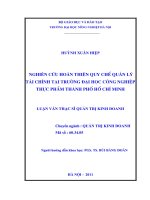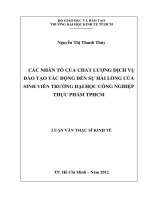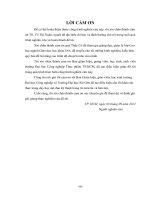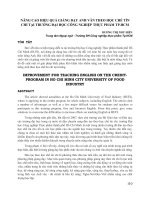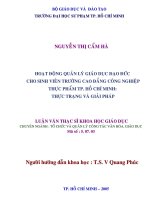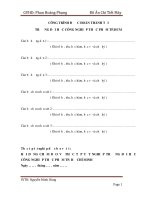- Trang chủ >>
- Đề thi >>
- Đề thi lớp 2
Vocabulary English and geography words - Trường Đại học Công nghiệp Thực phẩm Tp. Hồ Chí Minh
Bạn đang xem bản rút gọn của tài liệu. Xem và tải ngay bản đầy đủ của tài liệu tại đây (396.39 KB, 20 trang )
<span class='text_page_counter'>(1)</span><div class='page_container' data-page=1></div>
<span class='text_page_counter'>(2)</span><div class='page_container' data-page=2>
in context
<b>VOCABULARY</b>
in context
◆ <b>Historic Turning Points</b> ◆ <b>See the USA</b>
◆ <b>Leaders Then and Now</b> ◆ <b>Wonders of the World</b>
<b>VOCABULARY</b>
<b>HISTORY AND</b>
<b>GEOGRAPHY</b>
<b>WORDS</b>
</div>
<span class='text_page_counter'>(3)</span><div class='page_container' data-page=3>
Development and Production: Laurel Associates, Inc.
Cover Design: Elisa Ligon
Interior Illustrations: Katherine Urrutia, Debra A. LaPalm, C. S. Arts
Copyright © 2002 by Saddleback Educational Publishing. All rights reserved.
No part of this book may be reproduced in any form or by any means, electronic
or mechanical, including photocopying, recording, or by any information storage
and retrieval system, without the written permission of the publisher.
ISBN 1-56254-394-6
Printed in the United States of America
07 06 05 04 03 9 8 7 6 5 4 3 2 1
Three Watson
Irvine, CA 92618-2767
E-Mail:
Website: www.sdlback.com
E
VERYDAY
L
IVING
W
ORDS
H
ISTORY
AND
G
EOGRAPHY
W
ORDS
M
EDIA
AND
M
ARKETPLACE
W
ORDS
M
USIC
, A
RT
,
AND
L
ITERATURE
W
ORDS
S
CIENCE
AND
T
ECHNOLOGY
W
ORDS
W
ORKPLACE
AND
C
AREER
W
ORDS
</div>
<span class='text_page_counter'>(4)</span><div class='page_container' data-page=4>
▼
<b>Introduction</b>
...
4UNIT 1
<b>Preview</b> ... 5<b>LESSON</b>
<b>1</b>
<b>Unit 1 Glossary</b> ... 6<b>2</b>
Time Zones ... 9<b>3</b>
The Remarkable Road ofthe Inca Empire ... 12
<b>4</b>
Czar Peter the Great ... 15<b>5</b>
Abraham Lincoln and theGettysburg Address ... 18
<b>6</b>
Paul Revere’s Ride ... 21<b>7</b>
Vocabulary Stretch ... 24▼ <b>Unit 1 Review</b> ... 27
UNIT 2
<b>Preview</b> ... 30<b>LESSON</b>
<b>1</b>
<b>Unit 2 Glossary</b> ... 31<b>2</b>
The Dust Bowl ... 34<b>3</b>
The World Wars ... 37<b>4</b>
Dogs of War ... 40<b>5</b>
The Aztec Legendof <i>Tenochtitlan</i> ... 43
<b>6</b>
Special Lines of Latitude .. 46<b>7</b>
Vocabulary Stretch ... 49▼ <b>Unit 2 Review</b> ... 52
<b>CONTENTS</b>
UNIT 3
<b>Preview</b> ... 55<b>LESSON</b>
<b>1</b>
<b>Unit 3 Glossary</b> ... 56<b>2</b>
The Florida Everglades ... 59<b>3</b>
The Elephant andthe Donkey ... 62
<b>4</b>
Neck-and-Neck Racesto the White House ... 65
<b>5</b>
The Code of Hammurabi ... 68<b>6</b>
Athens and Sparta ... 71<b>7</b>
Vocabulary Stretch ... 74▼ <b>Unit 3 Review</b> ... 77
UNIT 4
<b>Preview</b> ... 80<b>LESSON</b>
<b>1</b>
<b>Unit 4 Glossary</b> ... 81<b>2</b>
Nat Love: From Slaveto Cowboy ... 84
<b>3</b>
Ellis Island: TheGolden Door ... 87
<b>4</b>
Chief Joseph Speaks ... 90<b>5</b>
The Monsoon ... 93<b>6</b>
King Tut’s Tomb ... 96<b>7</b>
Vocabulary Stretch ... 99▼ <b>Unit 4 Review</b> ... 102
▼
<b>End-of-Book Test</b>
...
105</div>
<span class='text_page_counter'>(5)</span><div class='page_container' data-page=5>
<b>INTRODUCTION</b>
Welcome to VOCABULARY IN CONTEXT!
A well-developed vocabulary pays off in many important
ways. Better-than-average “word power” makes it easier to
understand everything you read and hear—from textbook
assignments to TV news reports or instructions on how to repair
a bicycle. And word power obviously increases your effectiveness
as a communicator. Think about it: <i>As far as other people are</i>
<i>concerned, your ideas are only as convincing as the words you</i>
<i>use to express them.</i> In other words, the vocabulary you use when
you speak or write always significantly adds or detracts from
what you have to say.
VOCABULARY IN CONTEXT was written especially for <i>you</i>.
The program was designed to enrich your personal “word bank”
with many hundreds of high-frequency and challenging words.
There are six thematic books in the series—<b>Everyday Living</b>
<b>Words</b>,<b> Workplace and Career Words</b>,<b> Science and</b>
<b>Technology Words</b>,<b> Media and Marketplace Words</b>,<b> History</b>
<b>and Geography Words</b>, and <b>Music, Art, and Literature</b>
<b>Words</b>. Each worktext presents topic-related readings with key
terms in context. Follow-up exercises provide a wide variety of
practice activities to help you unlock the meanings of unfamiliar
words. These strategies include the study of synonyms and
antonyms; grammatical word forms; word roots, prefixes, and
suffixes; connotations; and the efficient use of a dictionary and
thesaurus. Thinking skills, such as drawing conclusions and
completing analogies, are included as reinforcement.
</div>
<span class='text_page_counter'>(6)</span><div class='page_container' data-page=6>
<b>UNIT 1</b>
<b>PREVIEW</b>
<b>HISTORY AND GEOGRAPHY WORDS</b>
Test your knowledge of the vocabulary skills, concepts, and terms you will study in
this unit. Answers are upside down on the bottom of the page.
<b>TRUE OR FALSE?</b>
Write <b>T</b> or <b>F</b> to show whether each statement is <i>true</i> or <i>false.</i>
1. _____ A <i>democracy</i> is usually headed by a <i>tyrant</i>.
2. _____ <i>Eighty</i> <i>degrees</i> can also be written <i>80</i><sub>°</sub>.
3. _____ The words <i>climate</i> and <i>weather</i> are antonyms.
4. _____ The words <i>boundaries</i> and <i>borders</i> are synonyms.
5. _____ The adjective form of <i>patriot</i> is <i>patriotic</i>.
6. _____ A <i>civil war</i> is fought between a country and its overseas
colonies.
7. _____ <i>Battlefield, freedom,</i> and <i>bloodshed</i> are all compound words.
8. _____ In the word <i>midnight</i>, the suffix <i>mid-</i> means “in the middle of.”
<b>SPELLING</b>
Circle the correctly spelled word in each group.
1. colunist collonist colonist
2. empiror emperor emperer
3. Massachusetts massachusetts Masachusetes
4. goverment govarment government
ANSWERS:T
RUE OR FALSE
?: 1. F 2.
T 3. F 4.
T 5.
T 6. F 7. F 8. F
</div>
<span class='text_page_counter'>(7)</span><div class='page_container' data-page=7>
<b>GLOSSARY</b>
<b>HISTORY AND GEOGRAPHY WORDS</b>
<b>Lesson 1</b>
<b>UNIT 1</b>
A <i>glossary </i>is a list of unusual or specialized words from a certain field of knowledge.
Following are some important words that relate to history and geography.
<b>canyon</b> a long, narrow valley with
high cliffs on each side, often with
a stream running through it
<b>civil war</b> war between sections or
groups of people of the same nation
<b>climate</b> the average weather
conditions in a certain region over
a period of years
<b>coast</b> land along the sea
<b>colonist</b> one of a group of people
who settle in a distant land, but
remain under the rule of the home
country
<b>czar</b> the title of any of the former
emperors of Russia
<b>democracy</b> government in which the
people hold the ruling power
<b>empire</b> a group of countries or
territories under the rule of one
government or person
<b>jungle</b> a tropical land thickly covered
with trees and other plants and
usually filled with animals
<b>longitude</b> distance measured in
degrees east and west of an
imaginary line running from the
North Pole to the South Pole
<b>North Pole</b> the spot that is farthest
north on the Earth
<b>patriot</b> a person who shows great
love and loyalty toward his or her
own country
<b>prime meridian</b> the imaginary line
from which longitude is measured
both east and west. Located at 0°
longitude, it passes through
Greenwich, England.
<b>regent</b> a person chosen to rule while
a king or queen is absent, sick, or
too young to take the throne
<b>serfs</b> farm workers who, almost like
slaves, belong to a landowner
<b>South Pole</b> the spot that is farthest
south on the Earth
<b>terrain</b> ground or area of land
</div>
<span class='text_page_counter'>(8)</span><div class='page_container' data-page=8>
<b>VOCABULARY IN CONTEXT</b>
Complete each sentence with a word from the glossary. Use the other words in the
sentence to help you decide which word to add. Check the dictionary definition if
you’re still not sure.
1. Year after year, the flowing river made the ____________________
deeper.
2. The ruler was a power-hungry ____________________ who demanded
total control of his people.
3. The rocky, uneven ____________________ made travel by vehicle
impossible.
4. Because the new king was only 10 years old, a ____________________
would head the government for several years.
5. When powerful families from two different regions claimed power,
____________________ broke out.
6. Around the whole Earth, there are 360° of ____________________.
7. The nobleman was a wealthy landowner who had many
____________________ farming his lands.
<b>WORD FORMS</b>
Add vowels (<i>a, e, i, o, u</i>) to complete a different form of some words from the
glossary. Use context clues to help.
1. Pollutants in the air can cause a cl__m__t__c change in a region.
2. The __mp__r__r ruled his vast lands from the capital city.
3. C__ __s t__l winds often bring rain from the west.
4. He felt it was his p__tr__ __t__c duty to vote in every election.
5. Massachusetts was one of the 13 original c__l__n__ __s.
</div>
<span class='text_page_counter'>(9)</span><div class='page_container' data-page=9>
<b>SCRAMBLED WORDS</b>
First unscramble the words from the glossary. Then solve the crossword puzzle with
words that complete the sentences.
<b>NOOLTISC _____________________</b> <b>MEIRPE ________________________</b>
<b>GLUNJE _______________________</b> <b>CAMECYDRO ____________________</b>
<b>LICTAME ______________________</b> <b>ZRAC __________________________</b>
<b>ACROSS</b>
3. Although living across
the sea, every American
____ had to follow the
laws of England.
5. The arctic ____ is so cold
that some lakes never thaw.
6. For nearly 20 years, the
____ ruled all of Russia.
<b>DOWN</b>
1. Huge vines hung from the
trees in the hot, steamy ____.
2. The founding fathers of the
United States wanted a ____
in which every citizen had
a voice in government.
J
D
C
E
C
C
1
6
5
4
3
2
4. The ruler added to his ____ by
conquering many small tribes.
<b>WORD HISTORY</b>
Some glossary words have origins in other languages. Write a letter to match each
<b>boldface </b>word with its origin. If necessary, check a dictionary.
1. _____ <b>canyon</b>
2. _____ <b>czar</b>
3. _____ <b>democracy</b>
4. _____ <b>empire</b>
5. _____ <b>serf</b>
6. _____ <b>terrain</b>
a. from the Latin word <i>caesar</i>, meaning “emperor”
b. from the Latin word <i>servus</i>, meaning “slave”
c. from ancient Greek words meaning “the
people” and “to rule”
d. from the Latin word <i>imperium, </i>meaning
“command, authority, realm”
e. from the Spanish word <i>cañon</i>, meaning “a
pipe,” “a tube,” or “a gorge”
</div>
<span class='text_page_counter'>(10)</span><div class='page_container' data-page=10>
<b>Lesson 2</b>
<b>UNIT 1</b>
<b>Time Zones</b>
<b>HISTORY AND GEOGRAPHY WORDS</b>
“Good morning,” Maria said
when she telephoned her cousin Sam
in New York. “It’s already a balmy
Saturday here in California!”
“Good <i>morning?</i>” her cousin
laughed. “Are you kidding? I’m just
about to eat lunch!”
Maria had forgotten all about
the three-hour time difference
between the west and east coasts of
the United States. When it is 9:00
A.M. in California, it is 12:00 noon in
New York.
There is a geographical reason
why clocks in different parts of the
world show different times. Time is
measured by the sun. As the Earth
rotates, the sun shines on different
parts of it. The side of the Earth
facing the sun experiences daytime
while the side turned away from the
sun experiences night. Every 24
hours, the Earth completes a rotation.
That means there are 24 hours in a
day—and there is a time zone for
each one of those hours.
The time zones closely follow the
lines of longitude. An imaginary line
called the <i>prime meridian</i> goes from
the North Pole to the South
Pole. It passes through Greenwich,
England and is the starting point for
measuring longitude. Longitude is
measured in degrees, so the prime
meridian has been designated 0°
longitude. There are 12 time zones
east of the prime meridian and 12
west of it. Another imaginary line,
called the International Date Line,
marks 180° longitude—halfway
around the Earth. When it is noon at
the prime meridian, it is midnight at
180° longitude.
</div>
<span class='text_page_counter'>(11)</span><div class='page_container' data-page=11>
<b>WORD SEARCH</b>
1. What 12-letter adjective from the reading
means “having to do with the study of the
Earth’s surface and natural features”? ____________________
2. What four-letter noun from the reading means
“an area or region that is set apart from the
parts around it in some special way”? ____________________
3. What nine-letter noun means “a distance east
and west measured by an imaginary line
running from the North Pole to the South Pole”? ____________________
4. What two words name a line of
longitude that is measured as 0°? ______________ __________________
5. What names are given to the spots that are farthest north and south
on Earth? ______________ __________ and ______________ __________
<b>ANALOGIES</b>
<i>Analogies </i>are statements of relationship. To come up with the missing word, you
must figure out the relationship between the first two words. Then complete each
analogy with a word from the reading that shows the same relationship.
1. <i>East coast</i>is to <i>west coast</i> as <i>North Pole</i>is to ____________ __________.
2. <i>Lines of latitude</i> are to <i>horizontal</i>as <i>lines of </i>____________________ are
to <i>vertical</i>.
3. <i>Everything</i>is to <i>nothing</i> as <i>nighttime</i> is to ____________________.
4. <i>Breakfast</i> is to <i>morning</i> as ____________________ is to <i>noon.</i>
5. <i>Plus</i> is to <i>+ </i>as <i>degree</i> is to ___________.
<b>EASILY CONFUSED WORDS</b>
Circle the word that correctly completes each sentence.
1. When ( it’s / its ) 3:00 P.M. in Oregon, it is 6:00 P.M. in New York.
2. The Earth never stops rotating on ( it’s / its ) axis.
3. “I’m ( already / all ready ) eating lunch!” exclaimed Sam.
4. The seven travelers were ( already / all ready ) to board the airplane.
g
z
l
p
N
S
m
P
P
l
d
l
</div>
<span class='text_page_counter'>(12)</span><div class='page_container' data-page=12>
<b>SYNONYMS</b>
Complete the puzzle with words from the
reading. Clue word are <i>synonyms</i> (words
with a similar meaning) of the answer words.
<b>ACROSS</b>
4. warm
5. 12:00 P.M.
7. bordering
8. cipher
<b>DOWN</b>
1. midpoint
2. 12:00 A.M.
3. unreal
6. turn
<b>MULTIPLE-MEANING WORDS</b>
Many words have different meanings, depending on their context. Read the two
definitions of each word. Then circle a letter to show the meaning <i>used in the</i>
<i>reading</i>. Finally, use that meaning of the word in a sentence of your own.
1. a. <b>coast:</b> land along the sea b. <b>coast:</b> to slide downhill
YOURSENTENCE: ______________________________________________________
2. a. <b>Earth:</b> the planet we live on b. <b>earth:</b> soil or ground
YOURSENTENCE: ______________________________________________________
3. a. <b>degrees:</b> units used to measure temperature
b. <b>degrees:</b> units used to measure angles and arcs of circles
YOURSENTENCE: ______________________________________________________
4. a. <b>standard:</b> something set up as a model to use for comparison
b. <b>standard:</b> a flag or banner of a military group or government
YOURSENTENCE: ______________________________________________________
H
M
I
B Y N
R
N
Z
1
6
5
4
3
2
</div>
<span class='text_page_counter'>(13)</span><div class='page_container' data-page=13>
<b>Lesson 3</b>
<b>UNIT 1</b>
<b>The Remarkable Road of the Inca Empire</b>
<b>HISTORY AND GEOGRAPHY WORDS</b>
Throughout the 15th century and
into the 16th, a mighty empire thrived
along the west coast of South America.
This was the land of the Inca. It was
ruled by an emperor believed to be the
son of the sun god. This godly mortal,
known as the Sapa Inca, faced a
daunting job. He needed to figure out
a way to unite his vast lands and
many peoples.
The emperor decided to link the
parts of his empire with an amazing
system of roads. This was a time when
most European roads were dirt tracks.
Eventually, the Inca roads covered
12,000 miles of desert and mountains.
Builders stretched bridges across rivers
and canyons. They cut tunnels
through mountains and chiseled steps
into slopes. The incredible Inca
engineers tackled varied climates and
terrain—from steep, icy mountain
sides to windswept lowlands and
steaming jungles.
The Royal Road of the Inca may
well be the world’s greatest feat of
engineering. It ran more than 1,250
miles—between the capital, Cuzco,
and the city of Quito in the north of
the empire. For most of its length, the
roadway was arrow-straight and 24
feet wide. The paving stones fit tightly
together like pieces of a jigsaw puzzle.
Trees gave shade, and a stream flowing
in a roadside ditch provided water.
The Inca road system was
off-limits to commoners—farmers or crafts
people, for example. Regular travelers
included the Sapa Inca’s warriors and
messengers. Relay teams carried news
throughout the empire. They had to
memorize their messages. Why?
Because the Inca had no system of
written language. A message could
travel the 1,250 miles from Quito to
Cuzco in five days. Travelers journeyed
the Royal Road by foot—perhaps
accompanied by a llama to carry gear.
Despite their engineering genius, the
Incas had not invented the wheel!
<b>WORD SEARCH</b>
1. What seven-letter plural noun from the
reading means “long, narrow valleys with
</div>
<span class='text_page_counter'>(14)</span><div class='page_container' data-page=14>
2. What seven-letter noun from the reading
means “the usual patterns of weather
conditions in a certain place”? ________________________
3. What seven-letter noun from the reading
means “the ground, or an area of land”? ________________________
4. What five-letter adjective from the reading
describes an event in which each member
of a team runs only a certain part of the
whole distance? ________________________
<b>SYNONYMS</b>
Complete the puzzle with words from the reading. Clue words are <i>synonyms</i> (words
with a similar meaning) of the answer words.
<b>ACROSS</b>
1. remarkable, amazing
4. prospered, flourished
5. human
6. fearsome, dismaying
<b>DOWN</b>
2. carved
3. trench, channel
<b>HOMONYMS</b>
<i>Homonyms</i> are words that sound the same but have different spellings and meanings.
For example, the words <i>bear</i> (the animal) and <i>bare</i> (without covering) are homonyms.
Circle the correct homonym in each sentence below.
1. The Royal Road was 1,250 ( feat / feet ) long.
2. The Inca believed their emperor was the ( sun / son ) of a god.
3. The Inca worshipped the ( sun / son ), which gave them light
and warmth.
c
t
r
I C D
T
M
D
1
6
5
4
</div>
<span class='text_page_counter'>(15)</span><div class='page_container' data-page=15>
4. The Inca had amazing roads, but they had not invented
the ( wheel / we’ll ).
5. Cuzco was the ( capital / capitol ) city of the empire.
6. Each stone fit together like a ( piece / peace ) of a jigsaw puzzle.
<b>COMPOUND WORDS</b>
Write a compound word from the reading to complete each sentence.
1. Artisans who craft tools and goods are called ________________.
2. An area that is banned or forbidden is said to be ___________________.
3. A paved surface used for travel is called a ____________________.
4. The land bordering a traveler’s route may be called the
____________________.
5. ____________________ are regions that are lower than the land
around them.
<b>SUFFIXES MEANING “ONE WHO”</b>
Words that end in <i>-or, -er, </i>or <i>-eer</i> often name people, such as <i>doctors, hikers,</i> and
<i>pioneers</i>, who “do something.” Complete each sentence with a word from the reading
that ends with one of these suffixes. Check a dictionary if you need help.
1. An ____________________ plans and designs roads, bridges,
buildings, and such.
2. A ____________________ erects buildings and other structures.
3. A ____________________ tills the soil before planting, growing, and
harvesting crops.
</div>
<span class='text_page_counter'>(16)</span><div class='page_container' data-page=16>
<b>HISTORY AND GEOGRAPHY WORDS</b>
<b>Lesson 4</b>
<b>UNIT 1</b>
<b>Czar Peter the Great</b>
to Russia, he brought weapons and
scientific tools. He also brought
artisans, engineers, and soldiers to
teach his people European skills. Two
barbers were included in the group.
Why? Peter had decided that his
noblemen must adopt western
fashions. He ordered them to shave
their long beards and get rid of their
flowing robes. Russian subjects did
as Peter ordered. They knew their
czar was a tyrant with a bad temper!
He could be very cruel to anyone who
did not agree with him.
Czar Peter built the city of St.
Petersburg. It would replace Moscow
as the capital. He called the
European-styled city his “Window on
the West” and declared that it would
open Russia to the world. Then Peter
claimed a new title. He became <i>Peter</i>
<i>the Great, Emperor and Father of the</i>
<i>Fatherland.</i>
With his European-style reforms,
Peter brought Russia into the modern
age. He extended its borders and
power. Still, most Russians remained
poor serfs, tied to the land of the
nobles they served. Peter’s “great”
reforms did nothing to improve the
lives of the masses.
In the 17th
century, two
boys were ready
to inherit the throne of Russia. The
czar had died, and his grandsons—
Ivan and Peter—were next in line to
rule. Since both were young, their
sister Sophia served as regent.
Peter spent his youth in the
countryside. There, the ambitious,
energetic boy launched an old boat
and learned to sail. As a teenager he
lived in the capital city of Moscow.
Its residents and their European
clothing and food were fascinating to
the boy from the country.
Peter grew to be a giant of a
man—nearly seven feet tall! By age
17, he knew that he wanted the
throne. He forced his sister Sophia
to resign. Ten years later, his brother
Ivan died. Peter became sole ruler of
Russia, a country that had become
the largest in the world. Russia had,
however, kept itself isolated. It had
fallen far behind the West in science
and education. Peter planned to
change that in a big way.
</div>
<span class='text_page_counter'>(17)</span><div class='page_container' data-page=17>
<b>WORD SEARCH</b>
1. What nine-letter verb from the reading
means “got something from a relative
when that person died”? _________________________
2. What nine-letter adjective from the
reading means “having a strong desire
to gain fame, power, or wealth”? _________________________
3. What seven-letter plural noun from
the reading means “changes meant to
improve the ways things are at present”? _________________________
<b>COMPOUND WORDS</b>
First unscramble the <i>compound words</i> (one word made from two or more words) from the
reading. Then use each unscrambled word to complete one of the sentences.
<b>SADROGSNN ___________________</b> <b>VASOERSE ______________________</b>
<b>HEFTANLARD __________________</b> <b>YESDOCTUNIR ___________________</b>
1. Russian people referred to their country as the ____________________.
2. When the old czar died, his two ____________________ were still very
young.
3. Peter was the first czar to travel ____________________ to Europe.
4. Peter spent his younger years in the Russian ____________________.
<b>HOMONYMS</b>
<i>Homonyms</i> are words that sound the same but are spelled differently and have different
meanings. In each sentence below, a homonym is used incorrectly. Circle the error. Then
write the correct homonym on the line. The first one has been done for you.
1. Peter became the soul ruler of Russia. ___________________
2. The Russian surfs, who worked the land,
remained poor and powerless under Peter’s rule. ___________________
3. Peter claimed the Russian thrown when
he was 17 years old. ___________________
i
a
r
</div>
<span class='text_page_counter'>(18)</span><div class='page_container' data-page=18>
4. As a young boy, Peter learned to sale a boat. ___________________
5. Peter the Great brought knew tools and
styles from Europe. ___________________
<b>WORD MEANINGS</b>
Complete the puzzle with words from the
reading. Clues are <b>boldface</b> words in the sentences.
<b>ACROSS</b>
1. Peter built St. Petersburg to be the
new Russian <b>seat of government</b>.
3. Peter ordered every noble to
get rid of his <b>chin hairs.</b>
6. Peter was so tall people called him a
<b>person of unusually huge stature</b>.
<b>DOWN</b>
2. Peter claimed a new <b>name showing</b>
<b>rank or role</b>, calling himself “Peter
the Great.”
3. Peter brought home two <b>hair stylists</b>
to spread western fashion.
4. Sophia, Peter’s sister, was forced to
<b>give up her job</b> as acting ruler of Russia.
C T
B R
F
G
1
6
5
4
3
2
5. Czar Peter was known
as the <b>male parent</b> of
the Fatherland.
<b>WHO ARE THEY?</b>
Match each word in the first column with the type of person it names. Write a letter
by each number.
1. _____ <b>czar</b>
2. _____ <b>regent</b>
3. _____ <b>artisan</b>
4. _____ <b>serf</b>
5. _____ <b>subjects</b>
a. people under the control of a ruler or
government
b. one chosen to head the government while a
ruler is sick, absent, or very young
c. a farmworker, much like a slave, who
belongs to the landowner
</div>
<span class='text_page_counter'>(19)</span><div class='page_container' data-page=19>
<b>HISTORY AND GEOGRAPHY WORDS</b>
<b>Lesson 5</b>
<b>Abraham Lincoln and the Gettysburg Address</b>
<b>UNIT 1</b>
The United States of America was
still less than 100 years old when it
was torn in two by the Civil War. In
1861, bitter warfare broke out
between the northern and southern
states. The war was a clash of
different ways of thinking, different
customs, and different ways of life.
In July of 1863, the tide of war turned
in favor of the North. It was then that
Union forces defeated Confederate
troops at Gettysburg, Pennsylvania.
During that three-day battle, the loss
of life on both sides was staggering!
More than 23,000 Union soldiers
died. About 28,451 men were lost
from the Confederate ranks.
On November 19 of the same
year, ceremonies were held to
dedicate a cemetery on the
Gettysburg battlefield. President
Abraham Lincoln was asked to say
a few words. The president came
prepared with a short speech
written on the back of an envelope.
Lincoln’s “Gettysburg Address”
would become one of history’s most
powerful calls for
democracy, equality,
and freedom.
Lincoln began his
speech by saying,
“Four score and seven
years ago our fathers
brought forth on this continent a new
nation, conceived in liberty and
dedicated to the proposition that
all men are created equal.” He ended
with these words: “We here highly
resolve that these dead shall not
have died in vain; that this nation,
under God, shall have a new birth
of freedom; and that government
of the people, by the people, and
for the people shall not perish from
the Earth.”
The victory at Gettysburg and
Lincoln’s speech made a difference.
His ringing declaration of democracy
and equality seemed to promise that
the end of the war was near. But the
bitter battles and bloodshed
continued until the Confederacy
finally surrendered in 1865.
<b>WORD SEARCH</b>
1. What five-letter adjective from the reading means
“of or within a country or government”? (Hint:
</div>
<span class='text_page_counter'>(20)</span><div class='page_container' data-page=20>
2. What eleven-letter noun from the reading
means “a public statement”? ____________________
3. What eight-letter verb from the reading
means “to open something or some place
with a formal ceremony”? ____________________
<b>UNDERSTANDING THE SPEECH</b>
Circle a letter to show how each sentence should be completed.
1. <i>Four score and seven</i> would be a period of
a. 27 years. b. 87 years. c. 107 years. d. 127 years.
2. When Lincoln refers to “our fathers,” he means
a. the Union generals. c. Grandfather Lincoln.
b. all American fathers d. The founding fathers of
and grandfathers. the United States.
3. To “die in vain” means to:
a. bleed to death. c. die uselessly, for no good cause.
b. die bravely. d. die in a bloody battlefield.
4. A government “of the people, by the people, for the people” could
best be described as a:
a. dictatorship. b. monarchy. c. tyranny. d. democracy.
<b>ANALOGIES</b>
<i>Analogies</i> are statements of relationship. To come up with the missing word, you
must figure out the relationship between the first two words. Then complete each
analogy with a word from the reading that shows the same relationship.
1. <i>North </i>is to <i>Union</i>as <i>South</i> is to ____________________.
2. <i>Dozen</i> is to <i>number 12</i> as <i>score</i> is to <i>number </i>____________________.
3. <i>Reign</i> is to <i>rain </i>as <i>vein</i> is to ____________________.
4. <i>King</i> is to <i>monarchy</i> as <i>president</i> is to ____________________.
</div>
<!--links-->
